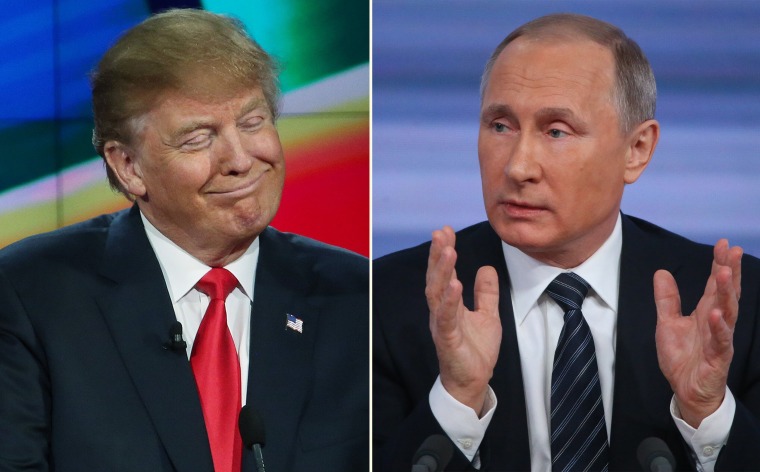If Donald Trump is elected president, he could push for an American foreign policy that is more favorable toRussian President Vladimir Putin's goals and interests, some experts fear — and he could unnerve U.S. allies.
Trump's praise for Putin's "strong" leadership has already caused issues, said Evelyn Farkas, a former deputy assistant defense secretary for Russia/Ukraine/Eurasia in the Obama administration and a senior fellow at the Atlantic Council.
"He's already done damage to us vis-a-vis Russia as a candidate. I frankly shudder to think what he could to U.S. interests as commander-in-chief and president," Farkas told NBC News.
Trump’s effusive admiration for Putin, who Sen. Lindsey Graham, R-South Carolina, referred to on Thursday as "a thug, a dictator, an autocratic ruler who has his opposition killed in the streets of Russia” has baffled many, including some in his own party. The Republican nominee recently rattled NATO partners in the Baltics when he suggested that he might not rush to their aid.
Putin annexed Crimea, invaded Ukraine, and Russia is the primary suspect in the hacking of the Democratic National Convention computers — just to name a few actions that have made the icy relationship with the U.S. even chillier in recent years.
Despite a history of differences, the U.S.'s relationship with Russia is not without hope: Late Friday, the two countries reached a ceasefire agreement to allow humanitarian aid into war-ravaged Syria. Secretary of State John Kerry hailed it as a possible "turning point."
But the agreement — which was welcomed by Turkey, the European Union, and other world powers — comes at a tenuous time in Syria's five-year-old civil war. Hours after it was announced, air strikes killed dozens in Syria.
Either way, long-standing disagreements between America and Russia haven't stopped Trump from heaping on the compliments of Putin.
“The man has very strong control over a country,” Trump told Matt Lauer Wednesday during NBC's Commander-in-Chief Forum. “It’s a very different system and I don’t happen to like the system, but certainly, in that system, he’s been a leader, far more than our president has been a leader.”
Related: Did Putin Really Call Trump 'Brilliant'? Experts Say It Got Lost in Translation
Nina Khrushcheva, a great-granddaughter of former Soviet Premier Nikita Khrushchev and a professor of international affairs at The New School, feels the Trump-Putin rapport could go one of two ways should Trump become president.
I frankly shudder to think what he could to U.S. interests as commander-in-chief and president."
"It will supposedly be a very positive relationship," she told NBC News. "But since Putin and Trump in some ways are similar — that is, they say it like it is and really don't mind the consequences — it also is entirely possible and likely that that relationship will collapse quickly because one will insult the other and try to show each other who's the better man."
Related: Why Russians Like Donald Trump (Sort of)
"The Cuban Missile Crisis would be nothing in comparison to what we would expect" if they had a fallout, Khrushcheva said. "I think either way, Trump's love for Putin or potential hate for Putin would lead to incredible world insecurity."
Other than a shared desire to eliminate North Korea's weapons program, Russia holds very few of the same major objectives as the U.S., Farkas said.
That means as president, Trump couldpush to change existing foreign policies dealing with Russia.
"We have an obligation to come to our NATO allies if they are attacked by a state such as Russia, and there is a very real threat being posed to our allies who are close to Russia's border," Farkas said.
If Trump reduces confidence among our allies that we will come to their defense, it "can lead to a whole chain of negative repercussions. Ultimately, the stability of Europe is in the interest of the United States, not just for political reasons but because they are our number one trading partner," she added.

In Asia, there could be more consequences, due to Russia's solidarity with China on global disputes.
"There are a number of horrendous scenarios because Putin's objectives are not aligned with ours in many places," Farkas said.
Related: Kerry: Deal With Russia Could Be 'Turning Point' in Syria War
Another Russia expert pointed out that Trump's compliments as a candidate might not indicate anything at all about how he governs if he's elected.
Anna Vassilieva, a professor at the Middlebury Institute of International Studies at Monterey, said there's no way to speculate. What is clear, though, is why the businessman-turned-politician connects with Putin.
"Trump obviously positions himself as a maverick, an anti-establishment candidate," Vassilieva told NBC News. "Putin is an independent politician. He's not succumbing to pressure, and there's a lot of pressure — from the West, of course, and the United States, the establishment."
"He's not obliged to do things. And I think that's something that's appealing to Trump." she said.
